In this episode, we talk to Lynn Whitnall about what it’s like to be the Director of the number one visitor attraction in Hertfordshire.
In this episode, we speak to Lynn Whitnall – she’s the Director of Paradise Wildlife Park, a Fellow of the Institute of Travel & Tourism and she also sits on the council of the British & Irish Association of Zoos & Aquariums (BIAZA).
Paradise Wildlife Park is a much-loved and highly esteemed venue that’s home to over 800 animals, including the largest collection of big cats in Britain. As well as wallabies, wolves and white lions, they also have five adventure playgrounds and one of the UK’s biggest and most spectacular animatronic dinosaur displays.
They’ve recently completed Drive4Wildlife – an epic adventure around East Africa where they donated funds and equipment to several projects along the way, including the African Wildlife Foundation and Ugandan Wildlife Education Centre.
“To start with, we were probably doing too much, too quickly. We had to pull it back a bit and think about where we wanted the future to be and where we wanted to go.”
What will you learn from this podcast?
- How the Sampson family transformed Broxbourne Zoo (known for being one of the worst zoos in the country) into Hertfordshire’s number one tourist attraction, Paradise Wildlife Park.
- What Lynn’s role as Director entails
- How the park prioritises education through different events and partnerships
- What the team’s brainstorming process looks like and how they choose ideas
- How the park uses feedback to improve their offerings
- The importance of conservation to zoos and aquariums
- The value of bloggers, vloggers and video content
- Lynn’s approach to fundraising
To listen to the full podcast, search Skip The Queue on iTunes, Google Podcasts and Spotify to subscribe. You can find links to every episode and more at www.rubbercheese.com/podcast.
You can also read the full transcript below.
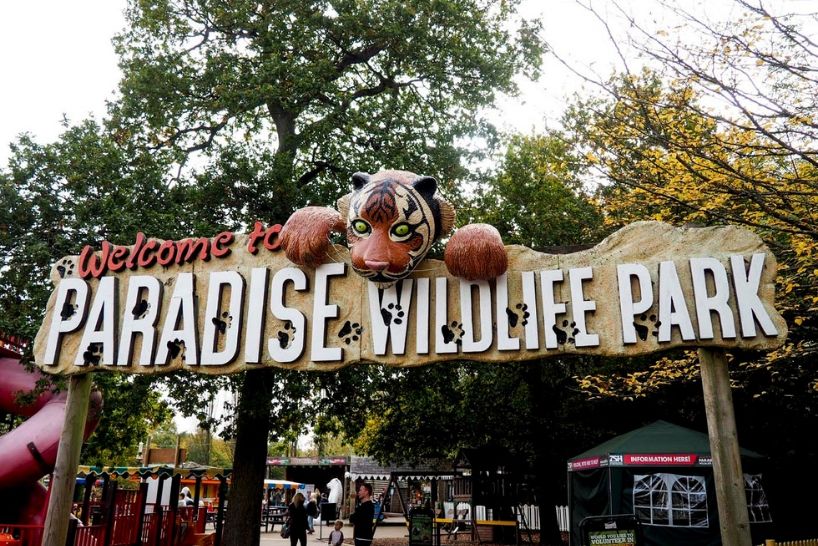
Image courtesy of notanothermummyblog.com
The interview
Your hosts, Kelly Molson and Paul Wright
Our guest, Lynn Whitnall
Kelly Molson: So Lynn, thank you for being on our Skip the Queue podcast. This is really exciting to have you along today.
Lynn Whitnall: Kelly and Paul, thank you so much for inviting me along to speak with you and share the story of our family wildlife park.
Kelly Molson: You are very welcome. So let’s start at the beginning of the wildlife park, so I think when your father purchased Broxbourne Zoo back in the 1980s it was widely regarded as maybe one of the worst zoos in the UK, which is really sad. But now Paradise Wildlife Park is the number one tourist attraction in Hertfordshire. Can you tell us a little bit about the zoo’s renovation and transformation over that time?
Lynn Whitnall: Yes, definitely. My parents bought the park, Peter and Grace Sampson, back in 1984. At that time, they had a large bus and coach company and travel agencies, and they were looking for somewhere to park their coaches and do work on the buses.
Broxbourne Zoo, just down the road from us, had come up for sale as freehold land. They thought it was an ideal opportunity to park the coaches and look after those 24/7 – but also to bring the animals back to health and build something like a Little Caesars Palace. We could use the coaches to bring people for evening events to help raise funds for the animals.
We had a huge passion for animals, but as we were growing up it was dogs, horses and guinea pigs more than exotic animals. So it was a huge challenge for all of us. And most people thought that we were absolutely mad! [My parents] actually bought [the park] on the 1st of April, which is ironic, April Fool’s Day. That was in ’84 so we’ve just had our 35th birthday.
The first couple of years were about clearing the rubbish – the original owner had turned [the site] into a local tip, where people could pay to tip their rubbish. It took us a couple of years to move the rubbish and get the animals back to health – get them into larger and better facilities for their welfare.
Bobby, the old lion, was in an aviary – a very, very small sort of cage. So, that was our first enclosure. Funny enough, this year we actually took that down and have doubled the size of it.
From there, it just went from strength to strength. A lot of the work that we did to start with, people couldn’t see. We had to put in wells, we had to put in sewage treatment plants, we had to do a lot of the underground infrastructure. [People] weren’t quite sure what we were actually doing with the money when they came in.
But gradually it sort of grew up. We did all the infrastructure, we started rebuilding all the enclosures, and the habitats, and everything for the animals, and started colouring it in with all the beautiful gardens and trees.
And then at the same time, we opened our restaurant, which catered for our daily visitors. We did weddings and events and we also had a nightclub as well! That was a great way of pulling in funds to do all the work that we needed to do within the park.
Paul Wright: That’s amazing. I didn’t realise there was a nightclub there.
Lynn Whitnall: It was called the Zoo Club. It was live music with The Overtures and Fret Monkey, and they came from miles around to join us for the evenings. It was absolutely fabulous.
Kelly Molson: What an entrepreneurial family though. It’s amazing you found so many different channels to drive the money that you needed to transform the park.
Lynn Whitnall: Yeah, we certainly come up with lots of ideas – from my parents through to my brother, Steve, to my immediate family, Craig and the boys, to all of our team as well.
Over the years, we’ve had some incredible keepers and just the general staff at the park, whether they’re admin, or maintenance, or building, or gardens, park services, they all come up with some fantastic ideas that we’re able to put into place really, to help move the park forward.
Over the last few years, in particular, we’ve introduced World of Dinosaurs, and we’re changing the habitat so there are fewer animals but more space for them. It’s a much better environment for them, and for our visitors to see, and a great way of educating people at the same time.
We’re just about to open Pride Lands, which is for our lion pride. The enclosure will be double the size of the enclosure they’re in at the moment and really quite natural.
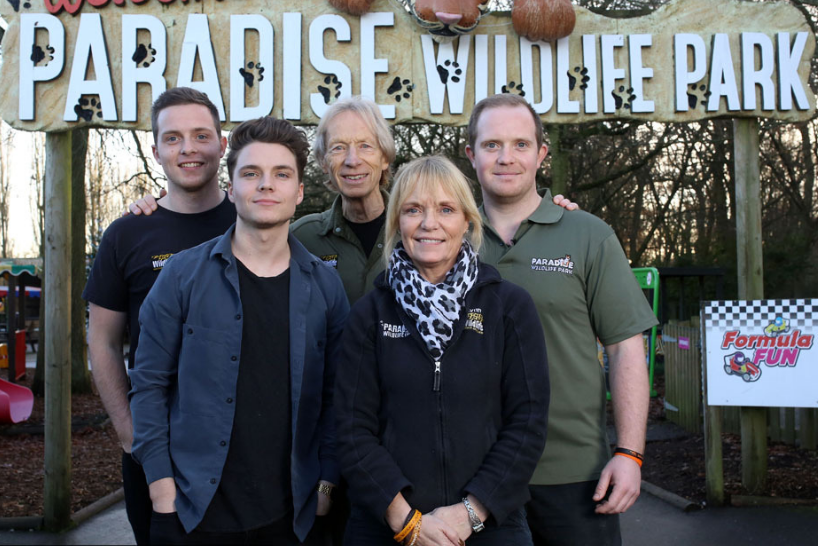
Lynn and her family have revolutionised the park
Kelly Molson: That’s wonderful. We’ll talk a little bit more about that later. What we really want to hear about now is your role as a Director and what that entails. So what would you say are the best and the most challenging aspects of your role?
Lynn Whitnall: I think that the best part of my role is every day is different, you are meeting new people every day. I’ve got an incredible, incredible team around me, not just at Paradise Wildlife Park, which is the Zoological Society of Hertfordshire, but also at our Big Cat Sanctuary in Kent.
I think being outdoors, not all the time, because I’m quite office-based, but just being able to go outdoors [is great] – [I] enjoy the animals that we have, the success we have in our breeding and our conservation [programmes] and the research that we do.
Education is just so important and we do that through fun, so it’s great for a complete family day out for all ages and it’s lovely to know that you can deliver for everybody.
Paul Wright: You talk about education, what do you say is the most important part of what you do every day and what the zoo does?
Lynn Whitnall: When it comes to education, there are different forms. We have our outreach program where we go to schools and clubs, and we talk to people about anything to do with the animals, the environment. It could be in-situ projects, ex-situ projects, it could be to do with plastics and recycling. There are so many different projects that we can actually speak about, about tourism and just business in particular.
It’s our signage, our interpretation, it’s our staff that go out and actually speak to our visitors. It could be a show or a presentation, it could be some of our experiences where you can actually go and meet our meerkats, and red pandas, and tickle a tapir, and feed a big cat.
There are so many different ways that we can actually educate. But I think the most important thing is we can actually bring the families and schools together and educate them through fun. They don’t even realise they’re being educated, but they go away with so many little fun facts – it’s just a great way of learning.
Paul Wright: Yeah, totally. I just want to go back quickly to how everyone gets involved with coming up with ideas. How do you choose which ideas to go with? I imagine it would be quite an investment for some of these ideas – some of them would be quite big, some would be quite small. How do you decide which ones to go with?
Lynn Whitnall: We’ve learnt over the years. To start with, there were so many ideas that we just continually kept putting [them] in place. And I think a very important thing is our parents were very strict that you only do what you can afford – if you’ve got money in the bank you can do it. So, we’re very lucky that we had that embedded in us.
But to start with, we were probably doing too much, too quickly. We had to pull it back a bit and think about where we wanted the future to be and where we wanted to go. Which animals we wanted to hold, the breeding programs we’d like to be involved in, and what we can do. [We wanted] a balance of family fun, play areas, catering and events, so [we had] the whole package when our visitors come to see us.
We have planning meetings. We come up with ideas, some we can do, some we can’t, some we’ll put forward for two or three years’ time, and we try to have a three to five year plan. Some of those could be [scheduled] for five to ten years [in the future].
We’ve got lots of things that we would like to do on-site, but we haven’t got the time, we haven’t got the money, and that’s why we need to be structured.
Because, at the same time, the site’s 35 years old, what we put in then needs to be replaced. For example, we’re doing Pride Lands at the moment, we’ve had to do all the infrastructure underneath, adjust our IT, our sewage, all that sort of thing. So everything has to be taken into consideration as well as what we’re actually putting on top of the land to make it look amazing for the environment and the animals that we hold.
Kelly Molson: So you mentioned the World of Dinosaurs a little while ago, and we’re talking about Pride Lands now, so those kinds of exhibitions and experiences will be a huge amount of investment for the park. How do you work out which ones are going to work out best for you, in terms of what the animals need and what the park needs?
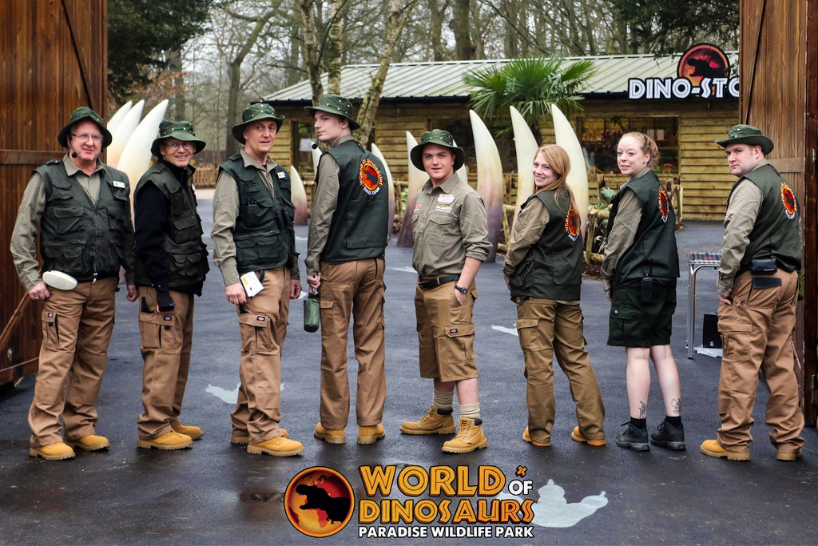
World of Dinosaurs is one of the park’s most popular additions
Lynn Whitnall: Well obviously we do our due diligence, so we look into them, we do our costings, we do projections, but at the end of the day you’ve sort of got your fingers crossed that it’s all going to work as well! I think we’ve been very lucky, to be honest with you.
[We’ve been lucky] with the team that we have, especially my husband Craig, who really looks into things like the World of Dinosaurs. We’re just raising the bar every year.
So yeah, I think it’s just making sure we keep in front of the trends as much as we possibly can, which we always have done as a family, and making sure what does go in is quality, and exceptionally good value for money as well.
Paul Wright: Do you regularly speak to the public and get their feedback before you go with any of the ideas?
Lynn Whitnall: We do. We actually have a newsletter that goes out to our season ticket holders and at times there are questions in there. We’ve done questionnaires before. We go around and talk to our visitors – we’re out there. We do get feedback and we act upon that.
Some of it is good, some of it is what could be improved, which is fantastic. And I think a lot of [our visitors] have grown up over the years with us. So some of them that came back 35 years ago, have now got their own children, or their own grandchildren. So they actually feel part of [the park].
So I think it’s quite nice, they’re quite happy to actually come forward and say, “We’d actually like to have this animal.” And then we can explain why we can or why we can’t.
[We get asked] “Is it possible to put this in?”. We specialise in areas for different disabilities, so we’ve got a play area where it’s got a wheelchair swing, swings with harnesses. We’ve got our ramps, disabled toilets, but we’ve also got a new one now which has got a hoist and a moving bed, and that was asked for by one of our members. That’s been so helpful to everyone.
Paul Wright: You spoke about people coming back year after year. Is that one of your main challenges, getting people to come back?
Lynn Whitnall: It is. I think number one, your website and number two, your marketing is crucial nowadays. Especially with social media. You know, you’re looking at the different platforms that you can utilise, your social influencers, your bloggers, YouTubers, there are so many different things out there on the social side of it. It’s so important to get that across.
But then you have to remember you’ve still got those that don’t necessarily do social media or wouldn’t necessarily go to your website. So it’s making sure, in the background, we’ve still got our posters up on big billboards, or our general leaflets. But the most important advertising is word of mouth.
And that’s why we’ve got to make sure that we deliver 100% and everyone is engaged, from our team to our contractors, to our visitors. So we know that we are delivering, we’re giving good value for money. We’re getting that balance between conservation, education, family fun, the breeding of our animals, so people do want to come back.
I think because we’re always investing, every year, [people] come back – there’s something different, something new and something for them to look forward to. We have our anaconda area, which has the largest anacondas on view to the public in the UK, and that Amazon Building is beautiful, Penguin Falls, World of Dinosaurs and we’ve just done Pride Lands.
I think [people] can see where the money is going, not just within our infrastructure, but also with the different breeding programs we have here in the UK. [We have] rerelease programs like the hedgehog release and projects around the world. I think it’s making sure we share that with everyone so they understand where every penny is going.
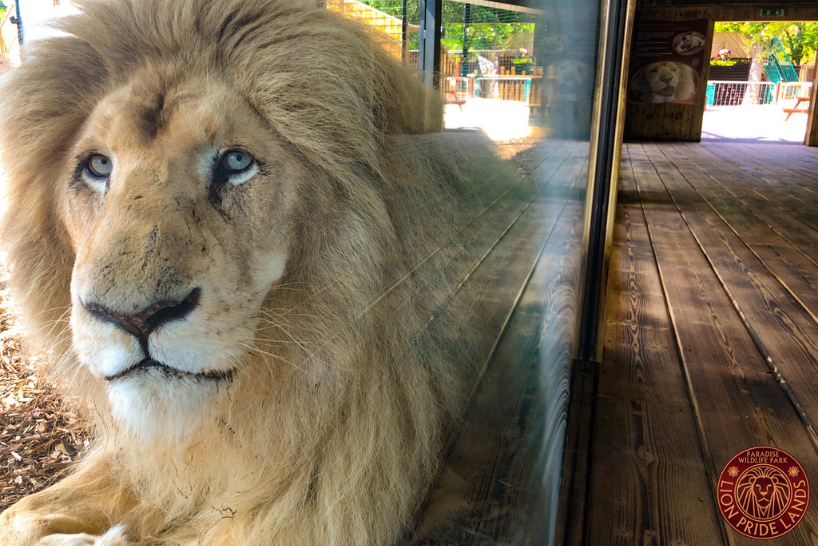
The park has just opened Pride Lands, the new enclosure for lions
Kelly Molson: Lynn, it sounds like one of your core values is an exceptional guest experience. I love what you talked about earlier about the facilities that you’ve put in place with the hoist, and making it a really inclusive experience. What do you hope that people will take away from their visit to the park? What do you want them to do once they’ve been?
Lynn Whitnall: I think taking away respect for the animals and the environment. There are different ecosystems and we need to be looking after them and protecting them within our shows and around our site. We talk about plastics and recycling. Again, they’re all important messages that we put across in a fun way.
So it could be our costume characters that are out and about doing that sort of thing, but I think it’s just making sure that [visitors] feel part of [the experience], and they’ve taken away lots of information that they can utilise in their own home and workplace, and with their families as well.
Kelly Molson: Can you tell us a little bit more about the conservation efforts that you started to talk about? You talked about the hedgehog release program, that sounded fun, but you said that you work with programs all around the world as well? Can you tell us a little bit more about those?
Lynn Whitnall: Our motto is “our life is wildlife”, and we’ve got to make sure that we don’t only look after the animals, but we look after the environment for them as well.
Over the years, right from the very start, our family helped start and run Project Lifeline, which was out in the Serengeti where the lions were being killed from distemper, which was coming from the dogs in the villages around the Serengeti. The London Zoo, University of Minnesota and several other places around the world actually came together with vaccines, volunteers, and Disney donated a Jeep and [we] went round the Serengeti injecting dogs.
To start with, the locals in the villages were completely against it. They didn’t understand. They thought their dogs were going to be put down or injured, but gradually they came round, and they would be queuing up to have their dogs and little puppies injected. Because of this, the distemper was more or less wiped out, and the population of lions grew incredibly.
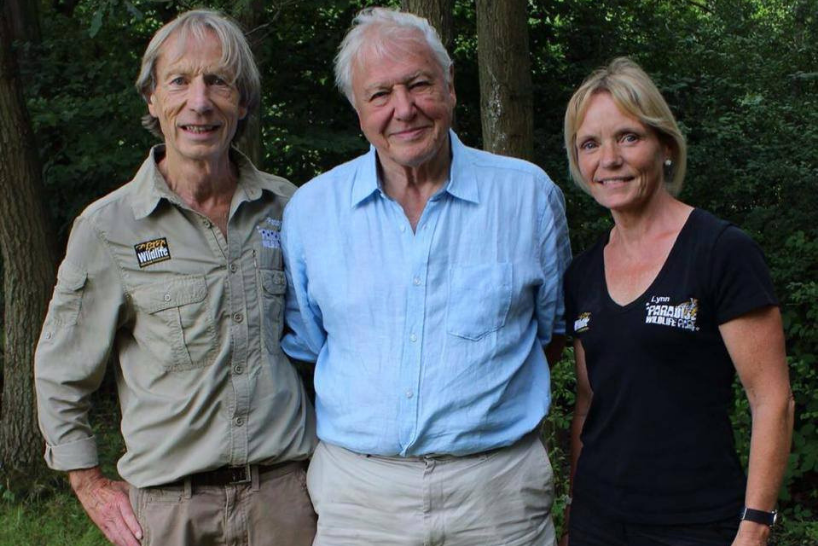
The team are incredibly passionate about conservation
[The charity has since been relaunched] to the Serengeti and it’s now a human charity as well. Rabies in children has gone down by 94% so that was a huge project that my brother Steve took the lead on back in the late 80s, 90s.
From there, we’ve helped raise and fund for a lot of the animals that we actually house at the park. So it could be the red pandas, the lowland tapirs, Brazilian tapirs, snow leopards, obviously the Amur Tigers, we’ve had cheetahs. There are lots and lots of different breeding programs that we have, that we financially support and do events about. Not only at the park, but we financially support those projects out in the field.
And it’s only in recent years where we’ve actually been able to do this ourselves. Some of our team has been able to go out and help. So, for example, a few years ago I went out to Sumatra and spent two weeks in the rainforest with the Tiger Conservation and Protection Unit. Out of all the challenges and things that I’ve done, that was the most dangerous. We went across the Sumatran rainforest in Kerinci Seblat over two weeks.
It was myself, Cheryl and three of the rangers – we had no tents, no toilets. It was exceptionally dangerous. We were taking down live snares and illegal camps on a daily basis. But it was so educational and so amazing to meet the people and [learn about] the work they do with such little funds and equipment – they just achieve so much. We came across logging where [people had] just literally slashed, burned and taken down the rainforest.
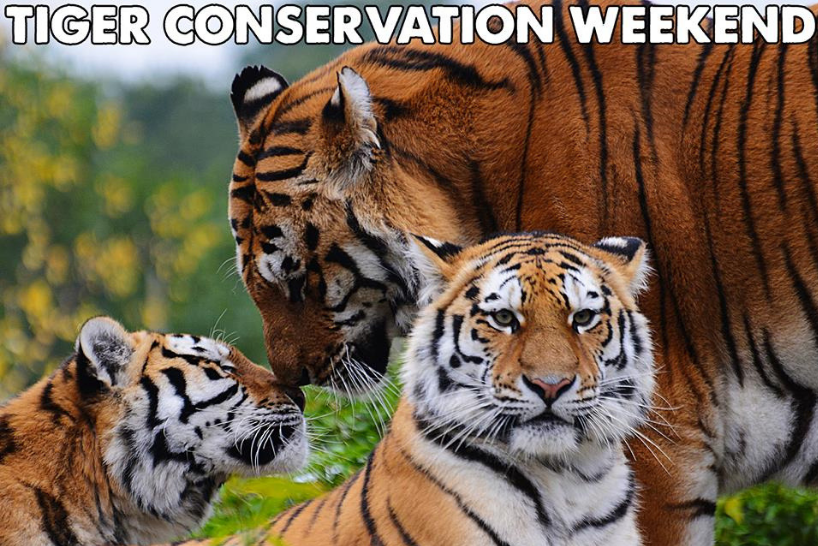
The park is passionate about tiger conservation
There were illegal plantations for palm oil and everything. Don’t get me wrong, some of it you can understand. The local people, they’re like us, they want the best for themselves and their children. They want their children to be educated, and they need to find a way of raising funds for that. So, as a little farm, they can actually achieve that. But when the big corporates come in and take over, it gets out of hand and we’re just taking away the natural environment for the animals that need to survive.
So they are just a couple of projects that we’ve done personally with a team of other zoo friends around the UK. We did Kilimanjaro, we did a relay channel swim. Tyler and I actually went to a free space camp last year at Mount Kala Patthar, and we went to the Chitwan National Park to learn about their work. There are lots of things our team do as well to help raise funds.
Every year I have a different fundraising plan, so [this is my] 16th consecutive London Marathon, I’ve got the London-Surrey 100 bike ride, the Serpentine two-mile swim, we had a skydive at the Big Cat Sanctuary, our sister park, the other side of Headcorn.
And there will be a project at the end of this year that we’ll be going abroad to help support, but I’m not 100% which one we’re actually going to do yet.
Kelly Molson: You like to keep yourself busy, don’t you Lynn?
Lynn Whitnall: Yeah, I don’t have a lot of time to get the training in, that’s the difficult thing. But it’s mental stamina and I think it’s just, yeah, I think that highlights probably the fact that I’m a bit mental, but there we go!
Kelly Molson: I think that’s fantastic. And these activities that you do, what’s that raising funds for?
Lynn Whitnall: To get my place in the London Marathon, I actually run with the President’s Sporting Club, which is the Essex disability charity and they support children with disabilities in sport. Some of [the children] have actually gone on to win gold in our Paralympics, which is incredible. It would be lovely for people to look up the charity because it is just heartwarming to see what they’ve achieved over the years. So that’s one of my fun races for this year.
We have three charities as a family. We have the Zoological Society of Hertfordshire. It’s a full charity and it used to be called “Friends of Paradise Wildlife Park” and it was run by some of our team, including myself, as well as a lot of volunteers.
We’ve got a little conservation store down on the animal park, and our keepers actually do animal weekends. It could be a red panda weekend, or reptile weekend, or bird weekend. And it’s nice because the keepers can actually choose which charities they would like to send some of the money to.
So that’s one charity – the Zoological Society of Hertfordshire gave £35,000 last year to projects in the UK and around the world. But we also give auction and raffle prizes as well.
Then [we have] our Big Cat Sanctuary, which is Wildlife Heritage Foundation, that’s based in Kent. That is a sanctuary purely for the smaller of the big cats. So we’ve got the smallest which is the rusty-spotted up to the Amur Tiger, which is the biggest. It’s not open to the public, but we have five amazing open days a year, seven stunning luxury lodges, and at both parks we do experiences, so that helps raise funds for the different projects again, around the world. Last year from the Big Cat Sanctuary, we donated £50,000 and raffle prizes, so added together it was about £200,000-£250,000. We’ll be doing the same this year.
But the important thing this year is [what] my three boys, Aaron, Tyler and Cameron [are doing] – [they] have grown up in the parks being costume characters, working on the little charity stall, farmyard and all the other sections, helping with events, and weddings, and parties around the park.
They actually went off to do Drive 4 Wildlife, so they went to four countries that we have supported for many years – Uganda, Rwanda, Tanzania and Kenya. That was funded by Motor Vision, [the boys] won a grant from them. The idea was to help those areas with motor parts, as well as looking at the environment, and obviously doing the right thing when it comes to fuels and emissions, et cetera.
They spent a month out there going around the four different countries and raising funds – the money raised [goes towards] a rescue vehicle. While they were out there, they also donated to Uganda Wildlife Education Centre, who took in two of our lionesses that we hand-reared about 10 years ago. They were looking for lionesses to go back to Africa. It’s easy to bring animals out of Africa, but not easy to take the animals back – it was to help education and breeding.
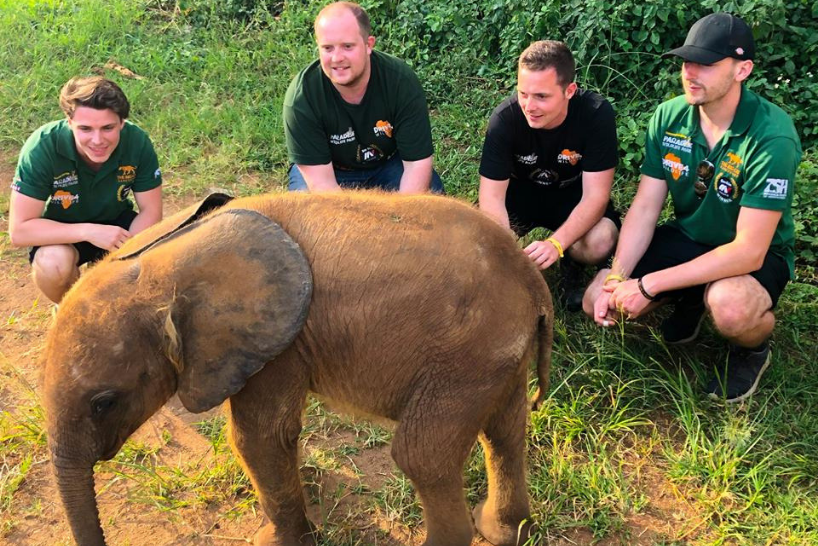
Drive 4 Wildlife saw the team visit Uganda, Rwanda, Tanzania and Kenya
African Wildlife Foundation does amazing work through all the countries and Ol Pejeta, where the boys actually went and met the last two Northern White Rhinos – two females – it’s a very, very sad story. But at least [what we’re doing] is helping with awareness and raising the funds that [the rhinos] need for the future. So this year we’ve already ticked quite a few boxes and donated quite a bit, but there’s a lot more to come.
Kelly Molson: Gosh Lynn, what an absolutely incredible thing for your sons to be able to do, what an amazing experience.
Lynn Whitnall: Yeah, and your listeners can actually follow them on Drive 4 Wildlife on our website and on YouTube, there are some amazing films out there that they’ve put together.
Kelly Molson: Oh brilliant. Well, what we’ll do is all of the things that we talk about today, we’ll have links to in the show notes so that all of our listeners will be able to go and look at the initiatives that you’re working on, and hopefully be able to continue support as well.
Lynn Whitnall: That’s fabulous. Thank you.
Kelly Molson: Actually, this brings me quite nicely to a question around some of the unique challenges zoos face? I’m sure you’ve experienced it – there are some negative feelings towards zoos, perhaps because [people] don’t understand the conservation efforts that go on. Would you say that that was one of the unique challenges zoos face?
Lynn Whitnall: Yeah, we do face a lot of challenges. I think the most important thing is getting a balance. You know, at the end of the day do we want to have a zoo? Perhaps we don’t, but at the end of the day, we do understand that these animals need a place. We took over a zoo where the animals were very inbred, very unwell, we got them back to good health. From there, those animals have helped as ambassadors for raising funds for education.
Also, some of those have been part of breeding programs, and we’re legislated by our zoo license. We’re members of BIAZA, the British and Irish Association, EAZA, the European, and the World Association of Zoos. And we work very closely with them, – they all have their protocols and their welfare [standards], and everything else that [needs to be] addressed. We want to achieve more.
And we are going to be accredited, hopefully later this year, and we want to make sure that everything is in place for the animals in our care. It’s very easy for people to say, “right we should close zoos and there shouldn’t be zoos”, but at the end of the day out in the wild, it’s not easy for those animals. You’ve got the illegal wildlife trade, you’ve got those that are cutting down the rainforests, you’ve got population growing and moving into the areas where the animals are.
So it’s so important that we do get this balance, so there is wildlife and there is breeding, and there is a future for everything. For not only my children and my grandchildren but future generations. Otherwise there won’t be anything for them to see, and unfortunately because of the illegal wildlife trade, if we don’t do something to stop it, it will all be gone.
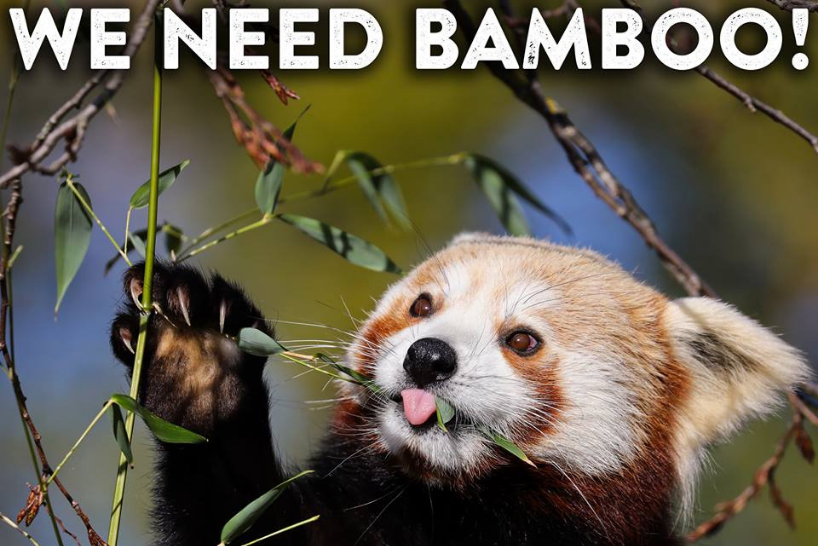
“It’s important we get this balance, so there is a future for everything”
Paul Wright: You talk about engaging with the next generation, the younger audience, how do you go about that?
Lynn Whitnall: We have different education programs in place at the park, and these can be found on our website as well. So it’s right from nursery schools, kindergartens through all the different key stages – they’re written especially for those age groups to help them engage.
Aaron and Amy, Amy is our education officer, Aaron is my oldest son, [have] put in place Heart, and that is about bringing together local schools to look at recycling. [They] make life-size animals out of recycled matter, it could be plastic bags, it could be bottles, it could be anything.
What we’re going to do [is] bring those statues on-site at the end of May for the half-term for everyone to see, and then in September we’re actually going auction them off to raise funds to go out to our conservation projects in Africa.
It’s been quite encouraging because normally you would send an email out and you wouldn’t necessarily get a lot of engagement. But this one, we’ve got 13 schools that have actually signed up, and there are already more waiting to join us for next year’s. So that’s a great way to educate and get everyone involved.
Paul Wright: So speaking to teachers and schools is really important to what you do?
Lynn Whitnall: Very, very. Yeah. Having that relationship with them, but also with the little children. It’s interesting because we may [promote] tigers or something, but if you ask the children what they really like when they come to the park, it could be the rabbits or it could be they just want to go in the paddling pool.
So again, it’s just making sure you have something for everybody, whether it’s the animals, or whether it is just the talks, the presentations, our paddling pool, dinosaurs, whatever it might be, it’s just getting that balance.
Paul Wright: So how do you reach out to schools and start that conversation and build relationships with them?
Lynn Whitnall: Oh we have our education officer, and she’ll be in contact with them via email and the schools are looking for somewhere to come as well. And it’s nice for the schools to get the children out into the fresh air. Just so they can sort of, I don’t know, it’s an adventure for them, isn’t it?
And it may be that they just go around our woodland and we’ve got a little area at the bottom, a little nature reserve where we’ve got our foxes in boxes, our deers and that, and they can go in there and they can do tree rubbings and collect the leaves and take them back to the schools and utilise them.
So there are so many different things that we can achieve when it comes to the education side of it. We may be a small park, but a big heart.
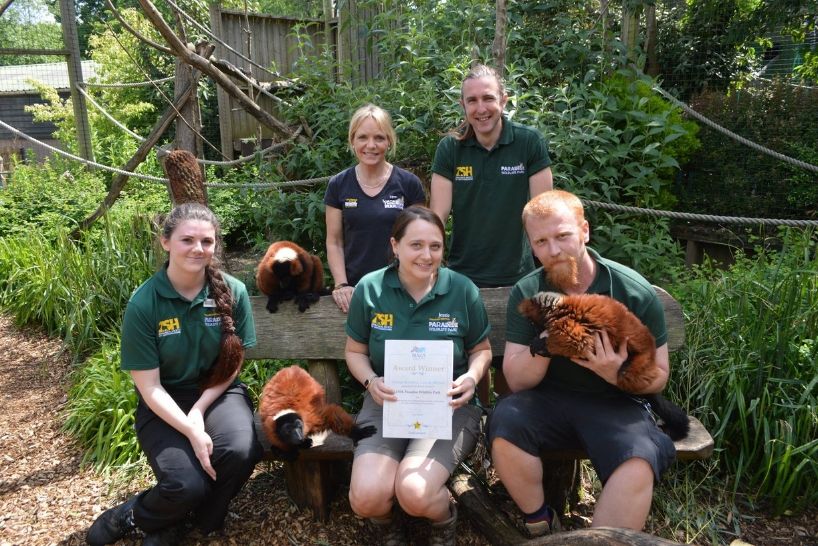
The Zoo Keepers at Paradise Wildlife Park help to educate the public
Kelly Molson: That’s lovely.
Lynn Whitnall: One thing that we have been very successful in is our breeding programs. So over the years, we’ve been very successful with all different sort of species of animals, [including] Tilly and Nan Pang our red pandas. If you haven’t seen them, there is the most amazing film on YouTube of the Tilly doing somersaults in her little breeding box.
We’ve also got Jessie and Punja, our snow leopards who are very loved-up. And again, there are some fabulous short films out there, and they’ve actually been picked up by NBC and ABC. We have literally got millions of people around the world watching these on a weekly basis, which is a fantastic way of getting the message out there.
Paul Wright: You mentioned earlier about influencers, are the animals your influencers?
Lynn Whitnall: Oh definitely, definitely, they’re our little stars.
Paul Wright: Yes, absolutely. Do you actually have human influencers or?
Lynn Whitnall: We do, yes. They apply to come to the park and they’re obviously looked into. They will go around the park, film it, put out different blogs on YouTube, wherever it may be, and say the good and the bad. Nine times out of ten, it’s absolutely fantastic, which is what we’re looking for. But it’s a great way to market the business and the park.
Paul Wright: How do you build relationships with them and approach them?
Lynn Whitnall: That’s through our amazing marketing team. They do that, Tyler takes [the lead].
Paul Wright: Do you have an internal marketing team?
Lynn Whitnall: Yes, yeah, it’s internal. We have got an agent also, that helps as well, so that’s getting out into the worldwide news and it does get picked up, which is lovely. And I think we’re very lucky with the background that the boys had in broadcasting and film and TV. So that does help them with the quality as well. They’ve got a good background.
Kelly Molson: It sounds like social media and video, in particular, have been very successful for you. Would you say that’s helped drive ticket sales?
Lynn Whitnall: Oh definitely, yes. Yeah, definitely. I think it’s a huge part of our numbers going up, which is fantastic. But also last year we had the most incredible summer as well, didn’t we? So the weather was fabulous. And the nice thing was where the World of Dinosaurs is, it’s in the woodlands, so you had the tree coverage from the sun, and then you have the paddling pool if you want to go out in the sun, and then you got the animals to wander round in-between. So it was absolutely perfect for all weathers.
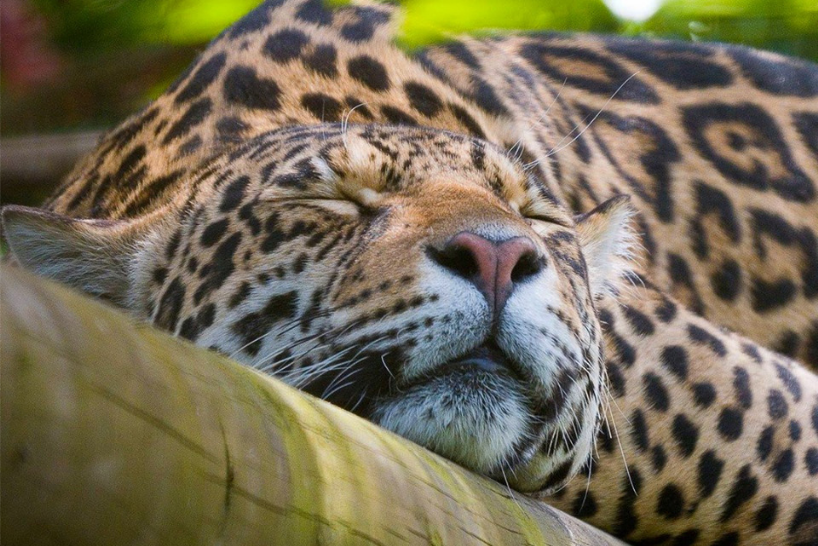
The park uses photography and video to capture people’s attention
Kelly Molson: So you’re 35 years old this year.
Lynn Whitnall: I wish I was, the park is.
Kelly Molson: The park is 35 years old this year. What can you tell us about the future for Paradise Wildlife Park? What’s coming next?
Lynn Whitnall: As I said earlier, we’re looking at “less is more”. So we’re looking at the animals we look after and care for at the park, making sure they are the ambassadors, and part of breeding programs. And also having less means that we can have more space for them, and make their exhibits and their habitats much more natural for them. So that’s the way we’re going with the park itself. And making sure that we do everything first-class and at a very, very high quality, and making sure that everyone feels part of that.
Then our sister park, the Big Cat Sanctuary in Kent, it’s exactly the same. We’re looking now at our small cats and perhaps relocating them to another area of the actual sanctuary, so they’ve got larger enclosures themselves. And then just looking at the habitats that we have for the big cats, and just making sure the infrastructure’s there.
Our biggest problem here at Paradise [is] from our front gates, we can actually see Centre Point, London – just literally a stone’s throw away. We had to put in our own electric substation. It looks as if we’re going to have to put another one in over the next year. We’re looking at traffic calming at the front of our front gate.
So there’s always something that people can’t see that you’re [spending on] – [you’re looking at something like] £250,000, £500,000 that needs to go into [infrastructure] to get [it] right before you can actually do the other bits and pieces you would like to do in the future. So that’s why we have the planning meetings to try and get the steps in the right place. It’s a very exciting future.
Paul Wright: Actually, I was going to ask this, it’s quite a big question, but what do you think is the future for zoos in general?
Lynn Whitnall: I think there will always be a place for zoos.
Paul Wright: Do you think they will evolve into maybe something more interactive?
Lynn Whitnall: Yeah, they will do definitely. Yeah, they will evolve and I think that’s what we’re doing now, just by having fewer animals, more space. So I think they will do, and I think everyone has to look at the animals and their welfare and make sure we’re doing the best thing that we possibly can for them. I think there is a place for zoos and aquariums in particular as well. And as I said, if we’re not careful, we’re going to lose the wild, so we need to get a balance between them.
Paul Wright: That’s the most important thing, isn’t it?
Lynn Whitnall: Yes it is.
Kelly Molson: I think less is more is a great mantra Lynn.
Lynn Whitnall: Thank you.
Kelly Molson: Thank you so much for being on the podcast today. We have thoroughly enjoyed speaking with you.
Lynn Whitnall: Thank you.
Kelly Molson: Thank you for being our first podcast guest.
Paul Wright: We feel honoured to have Hertfordshire’s number one visitor attraction for the first podcast, is great.
Lynn Whitnall: No, it’s been absolutely fabulous. Thank you so much and I hope that you’ll be able to come down and visit us this summer, and perhaps we can do a live podcast from Paradise Wildlife Park, and you’ll be able to see our lion Pride Lands.
Kelly Molson: We would absolutely love it there Lynn.
Lynn Whitnall: Thank you so much.
Do you know someone we should be talking to?
Do you know someone fascinating we should be talking to?
If so, email us at hello@rubbercheese.com – we’ll get back to you shortly.
Image credits: not another mummy blog, and Paradise Wildlife Park.

Related articles
Podcast
What makes a successful escape room? We get the inside scoop from CryptX founder, James Ducker
Podcast
50,000 visitors within three months of opening? No problem for William’s Den owners, Tor and Christian Carver
Podcast
We’ve launched Skip the Queue, a podcast for visitor attraction professionals